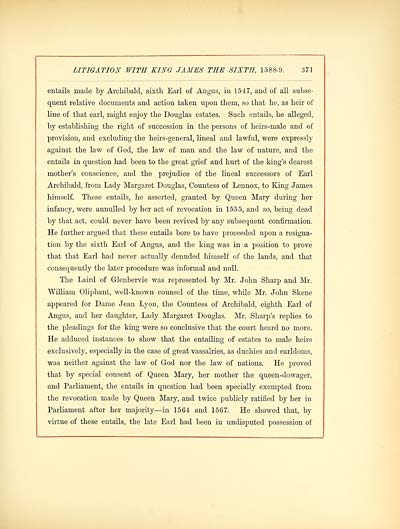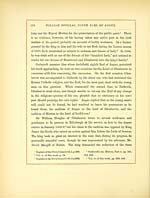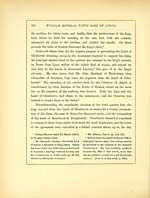Douglas book > Angus memoirs
(395) Page 371
Download files
Complete book:
Individual page:
Thumbnail gallery: Grid view | List view

LITIGATION WITH KING JAMES THE SIXTH, 1588-9. 371
entails made by Archibald, sixth Earl of Angus, in 1547, and of all subse-
quent relative documents and action taken upon them, so that he, as heir of
line of that earl, might enjoy the Douglas estates. Such entails, he alleged,
by establishing the right of succession in the persons of heirs-male and of
provision, and excluding the heirs-general, lineal and lawful, were expressly
against the law of God, the law of man and the law of nature, and the
entails in question had been to the great grief and hurt of the king's dearest
mother's conscience, and the prejudice of the lineal successors of Earl
Archibald, from Lady Margaret Douglas, Countess of Lennox, to King James
himself. These entails, he asserted, granted by Queen Mary during her
infancy, were annulled by her act of revocation in 1555, and so, being dead
by that act, could never have been revived by any subsequent confirmation.
He further argued that these entails bore to have proceeded upon a resigna-
tion by the sixth Earl of Angus, and the king was in a position to prove
that that Earl had never actually denuded himself of the lands, and that
consequently the later procedure was informal and null.
The Laird of Glenbervie was represented by Mr. John Sharp and Mr.
William Oliphant, well-known counsel of the time, while Mr. John Skene
appeared for Dame Jean Lyon, the Countess of Archibald, eighth Earl of
Angus, and her daughter, Lady Margaret Douglas. Mr. Sharp's replies to
the pleadings for the king were so conclusive that the court heard no more.
He adduced instances to show that the entailing of estates to male heirs
exclusively, especially in the case of great vassalries, as duchies and earldoms,
was neither against the law of God nor the law of nations. He proved
that by special consent of Queen Mary, her mother the queen-dowager,
and Parliament, the entails in question had been specially exempted from
the revocation made by Queen Mary, and twice publicly ratified by her in
Parliament after her majority — in 1564 and 1567. He showed that, by
virtue of these entails, the late Earl had been in undisputed possession of
entails made by Archibald, sixth Earl of Angus, in 1547, and of all subse-
quent relative documents and action taken upon them, so that he, as heir of
line of that earl, might enjoy the Douglas estates. Such entails, he alleged,
by establishing the right of succession in the persons of heirs-male and of
provision, and excluding the heirs-general, lineal and lawful, were expressly
against the law of God, the law of man and the law of nature, and the
entails in question had been to the great grief and hurt of the king's dearest
mother's conscience, and the prejudice of the lineal successors of Earl
Archibald, from Lady Margaret Douglas, Countess of Lennox, to King James
himself. These entails, he asserted, granted by Queen Mary during her
infancy, were annulled by her act of revocation in 1555, and so, being dead
by that act, could never have been revived by any subsequent confirmation.
He further argued that these entails bore to have proceeded upon a resigna-
tion by the sixth Earl of Angus, and the king was in a position to prove
that that Earl had never actually denuded himself of the lands, and that
consequently the later procedure was informal and null.
The Laird of Glenbervie was represented by Mr. John Sharp and Mr.
William Oliphant, well-known counsel of the time, while Mr. John Skene
appeared for Dame Jean Lyon, the Countess of Archibald, eighth Earl of
Angus, and her daughter, Lady Margaret Douglas. Mr. Sharp's replies to
the pleadings for the king were so conclusive that the court heard no more.
He adduced instances to show that the entailing of estates to male heirs
exclusively, especially in the case of great vassalries, as duchies and earldoms,
was neither against the law of God nor the law of nations. He proved
that by special consent of Queen Mary, her mother the queen-dowager,
and Parliament, the entails in question had been specially exempted from
the revocation made by Queen Mary, and twice publicly ratified by her in
Parliament after her majority — in 1564 and 1567. He showed that, by
virtue of these entails, the late Earl had been in undisputed possession of
Set display mode to:
![]() Universal Viewer |
Universal Viewer | ![]() Mirador |
Large image | Transcription
Mirador |
Large image | Transcription
Images and transcriptions on this page, including medium image downloads, may be used under the Creative Commons Attribution 4.0 International Licence unless otherwise stated. ![]()
| Histories of Scottish families > Douglas book > Angus memoirs > (395) Page 371 |
|---|
| Permanent URL | https://digital.nls.uk/96536534 |
|---|
| Attribution and copyright: |
|
|---|---|
| Description | A selection of almost 400 printed items relating to the history of Scottish families, mostly dating from the 19th and early 20th centuries. Includes memoirs, genealogies and clan histories, with a few produced by emigrant families. The earliest family history goes back to AD 916. |
|---|

